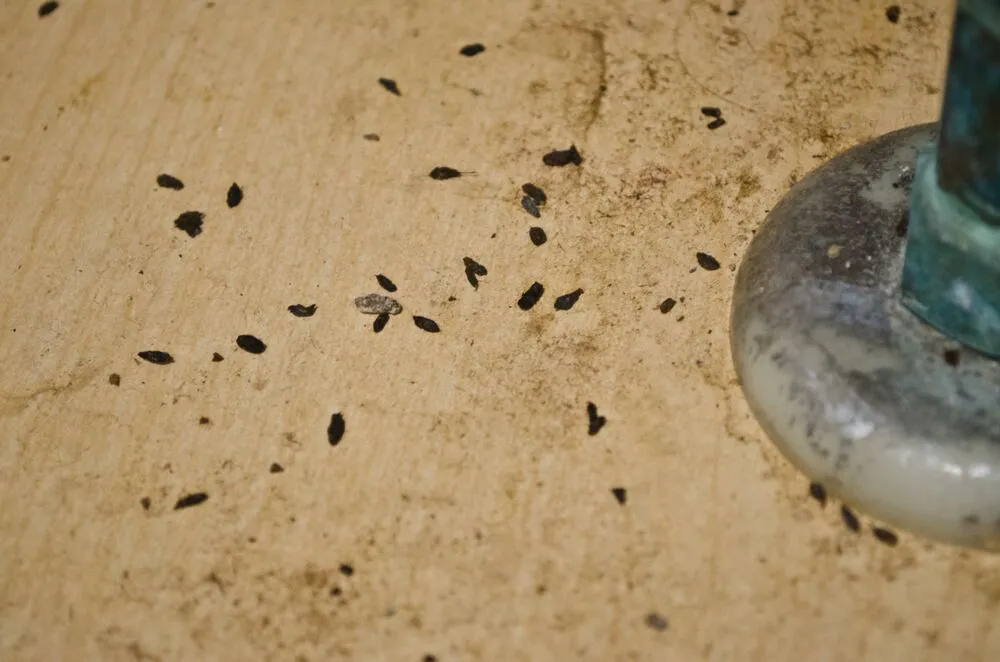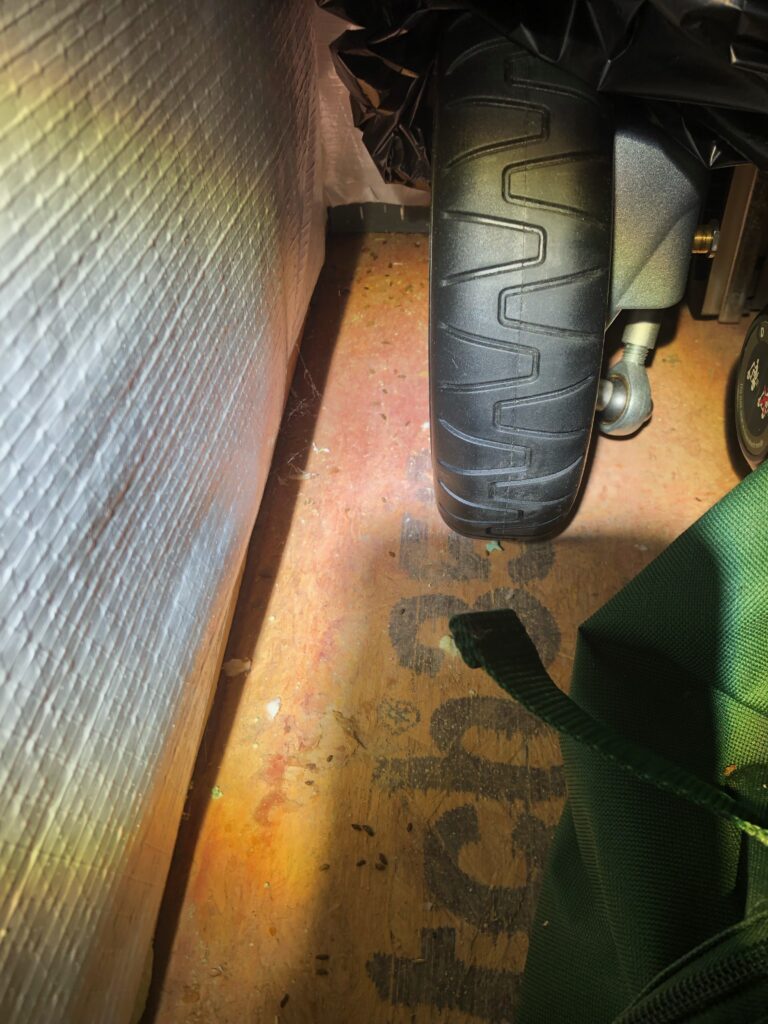Mouse droppings are more than just a nuisance—they pose serious health risks. Knowing how to handle mouse droppings safely is crucial for protecting yourself and your loved ones. If you do not take care of the mouse infestation, you will continuously have to clean up mouse poop and disinfect the area.
Identifying Mouse Droppings in Your House

Mouse droppings are a clear indication of a mouse infestation in your home. Identifying these droppings is crucial for taking appropriate action to ensure the health and safety of your household. Here are key factors to consider when identifying mouse droppings:
Physical characteristics: Mouse droppings are small, cylindrical, and resemble black grains of rice. They are typically about 1/4 inch long with pointed ends. Fresh droppings are moist and dark with a shiny appearance. Older droppings are dry, crumbly, and lighter in color.
Distinguishing other rodent dropping: It is important to differentiate mouse droppings from those of other pests like rats or cockroaches. Rat droppings are larger with blunt ends, while mouse droppings are smaller with pointed ends. Mouse droppings are usually scattered throughout an area, unlike cockroach droppings, which are more concentrated in specific spots.
Where to look: Mice leave droppings in areas they frequent, such as along walls, near food sources, water heaters, and inside cabinets or drawers. Common areas to check include kitchens, pantries, basements, crawlspaces, and attics.
Understanding the Dangers of Mouse Droppings
Mouse droppings might seem harmless, but they carry significant health risks. These small feces can harbor harmful bacteria, viruses, and parasites, leading to various diseases and infections.
One of the primary health risks associated with mouse droppings is disease transmission. Droppings can carry bacteria such as Salmonella and Escherichia coli (E. coli), which cause food poisoning and severe gastrointestinal issues when ingested. Moreover, mouse droppings can transmit Hantavirus, a potentially life-threatening disease affecting the respiratory system.
Common diseases spread by mouse droppings include leptospirosis, a bacterial infection that can cause liver and kidney damage, and lymphocytic choriomeningitis (LCM), a viral illness affecting the central nervous system. Hantavirus Pulmonary Syndrome (HPS) is only spread by deer mouse and white-footed mouse.
These diseases can be contracted through direct contact with droppings, breathing airborne particles, or ingesting contaminated food or water.

Don't know what pests in your house?
How to Safely Clean Up Mouse Droppings
Do NOT vacuum or sweep mouse droppings, urine, or nesting materials!
Diseases are mainly spread by mice when you breathe contaminated air. Sweeping and vacuuming can cause tiny droplets to get into the air. Taking precautions when cleaning up mouse droppings is essential to protect yourself from potential health risks.
How to Clean Up Mouse Droppings off of the Floor
Supplies:
- Rubber or plastic gloves
- Disinfectant
- Paper towels
- Mop or sponge
How to:
- Ventilate the area for 30 minutes before cleaning.
- Wear proper PPE rubber or plastic gloves and a mask or respirator,
- Spray urine and droppings with a bleach solution or household disinfectant.
- Wait 5 minutes.
- Wipe with a paper towel and throw it away.
- Mop or sponge the area with a disinfectant.
- Wash hands or disinfect gloves before removing
- Wash hands with soap and water after removing gloves.
You can find mice feces in other areas besides floors or countertops. Follow the CDC for tips on how to clean up areas like carpets, clothing/bedding/stuffed animals, and books or papers.
Trutech Wildlife Service provides remediation services that include disinfecting and sanitizing animal feces and urine in difficult areas like attics, soiled insulation, inside walls, and HVAC units.
Preventing Mouse Infestations
Mouse infestations pose health risks and can be a nuisance. Implementing effective strategies to prevent mice from entering your property is essential for maintaining a safe and rodent-free home.
Here are some practical tips:
- Sealing entry points: Inspect your home’s exterior and seal any cracks or gaps that mice can use to enter. Pay special attention to areas where utility lines enter the house, as well as gaps around doors, windows, and vents. Use steel wool or caulk to fill these openings, making it difficult for mice to get inside.
- Proper food storage and waste management: Mice are attracted to accessible food sources. Store food in airtight containers, including pet food. Regularly clean up crumbs and spills, and avoid leaving dishes unwashed overnight. Ensure that your trash cans have tight-fitting lids and are emptied regularly to discourage mice from scavenging for food.
By implementing these preventive measures, you can significantly reduce the risk of a mouse infestation.
However, if you suspect you already have a mouse problem or need assistance with prevention, consider contacting a professional pest control service at Trutech Wildlife Service. Our experienced technicians can help identify and eliminate any existing mouse infestations and install exclusion devices to keep mice out.
Professional Mouse Control Services
Hiring professional pest control experts offers numerous benefits when dealing with a mouse infestation. Professionals have the knowledge and experience to effectively eliminate mice from your property and access specialized mouse control solutions not available to the general public.
At Trutech Wildlife Service, we understand the importance of swift and thorough mouse control. Our experts are trained and equipped with mouse control techniques and methods to exterminate the existing mouse population. We use a combination of traps, bait stations, and exclusion methods to target mice at their source, preventing further infestations.
By choosing Trutech Wildlife Service for your mouse control needs, you can have peace of mind knowing that you are receiving professional and reliable services. Our goal is to ensure that your property remains mouse-free, providing a safe and hygienic environment for you and your family.
FAQs about Mouse Droppings
Mouse droppings are a common sign of a mouse infestation in homes and businesses. Here are some frequently asked questions about mouse droppings:
Mice are prolific poopers and can produce droppings multiple times a day. A single mouse can leave behind hundreds of droppings in a week, depending on its diet and activity level.
Yes, mouse droppings can pose health risks, especially when they dry and become airborne. The droppings can release harmful particles, such as bacteria and viruses, which can lead to respiratory issues when inhaled. People with asthma or allergies are particularly susceptible.
If you discover mouse droppings in your living space, it is essential to take immediate action. Start by wearing protective gloves and a mask to avoid direct contact and inhalation of any potential pathogens. Thoroughly clean the affected area using a disinfectant and dispose of the droppings safely. It is also crucial to identify and eliminate the source of the infestation to prevent further contamination.
If you are dealing with a severe mouse infestation or require assistance, it is recommended to contact a professional pest control service like Trutech. With their expertise and safe removal methods, they can help eliminate the infestation and ensure your home or business is rodent-free.



